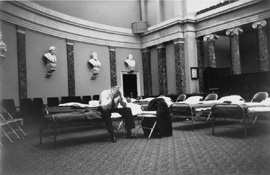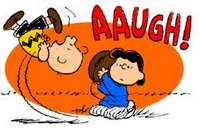 Tiger Woods roared from 2 shots back on Sunday to win the Buick Invitational at Torrey Pines in San Diego, California, to defeat Charles Howell III by 2 strokes. His surge was an impressive display of power, touch, and consummate skill under pressure. In other words, it was typical Tiger Woods.
Tiger Woods roared from 2 shots back on Sunday to win the Buick Invitational at Torrey Pines in San Diego, California, to defeat Charles Howell III by 2 strokes. His surge was an impressive display of power, touch, and consummate skill under pressure. In other words, it was typical Tiger Woods.He closed with a 6 under par 66 and claimed his seventh consecutive PGA Tour victory, dating back to his win at the Open Championship at Hoylake in July 2006.
This is the second-longest streak in PGA Tour history, behind only Byron Nelson, who won 11 straight PGA tournaments in 1945. Before he sank his par putt on 18 to seal the victory, Tiger's streak of six-in-a-row had tied him fo second-plac in the record book with Ben Hogan's run in 1948 and his own streak of six straight wins over two seasons in 1999 and 2000.
Still, as with the debate over what to call his string of 4 straight majors victories in 2000-01, how to define this streak of consecutive PGA Tour tournaments has caused a minor controversy among some golf fans. Then, it was whether or not to call Tiger's achievement the Grand Slam, a term coined by O.B. Keeler after Bobby Jones won the U.S. and British Amateur Championships and the U.S. Open and Open Championship in 1930. Many self-described traditionalists claimed that to be labeled as such, the true Grand Slam had to be achieved in a calendar year. Others said that winning four consecutive majors was the criteria, regardless of whether the feat was achieved in a single year or over the course of two seasons. Thus, the "Tiger Slam" was born.
Now, many of these same "traditionalists" are arguing that Tiger's streak ended last year either when he lost in the first round of the HSBC Match Play last September or when he finished in 2nd place in stroke play events in Europe and Asia. Those who defend the streak say that, as with Byron Nelson's 11 straight wins, the streak only applies to PGA Tour tournaments.
Both sides present cogent arguments. The traditionalists say that Byron Nelson's streak should stand alone, regardless of how many consecutive PGA Tour tournaments Tiger Woods wins, because Nelson's PGA Tour tournament streak was not interrupted by losses in non-PGA Tour events. These traditionalists argue that those who claim the streak is now at 7 are, in effect, giving Tiger a "mulligan". They have a point, but the fact that Nelson's streak included a victory at the Miami Four Ball, in which he teamed with Harold (Jug) McSpaden to win four matches, simply highlights the fact that comparing the PGA Tour in 1945 to the PGA Tour in 2006-07 is an impossible task.
The defenders of Tiger's streak state that it applies to PGA Tour tournaments, and that, by definition, Tiger Woods has now won the last seven PGA Tour tournaments in which he has competed. The PGA Tour does not recognize Tiger Woods' non-tour victories in its official records and statistics, how then can non-tour losses be counted against a PGA Tour winning streak? In that sense an analogy can be drawn to a major league baseball player who, after hitting in 30 straight MLB games, plays a few exhibition games in Japan in which he goes hitless. When he returns to MLB play, his hit streak would still stand at 30 games.
For what it's worth, Tiger Woods himself has stated his streak ended at 6 last year. It is obvious that he is not particularly concerned as to what others label his current run of stellar play. He is focused on doing what he does best, winning tournaments and adding to his already considerable legacy. Golf's best golfer started 2007 the way he ended 2006, playing great golf and poised to resume his assault on the sport's record books. He is far and away the best in the game today and probably the best golfer of all time. I would hope that is something on which both sides in the "streak debate" can agree.








